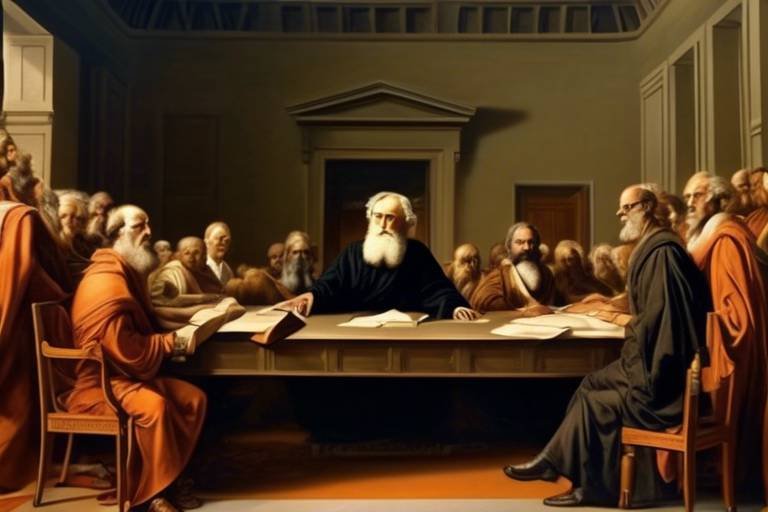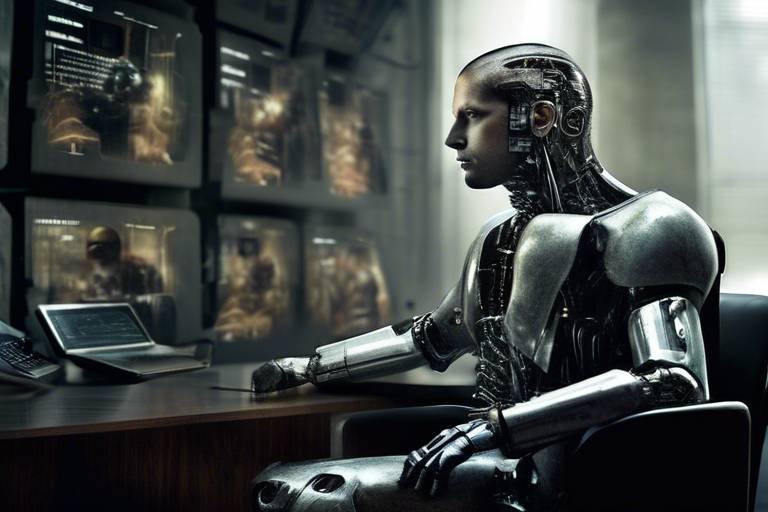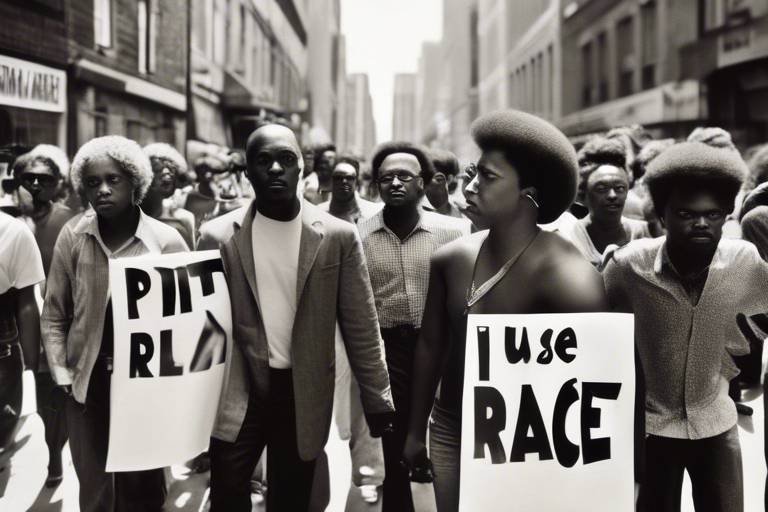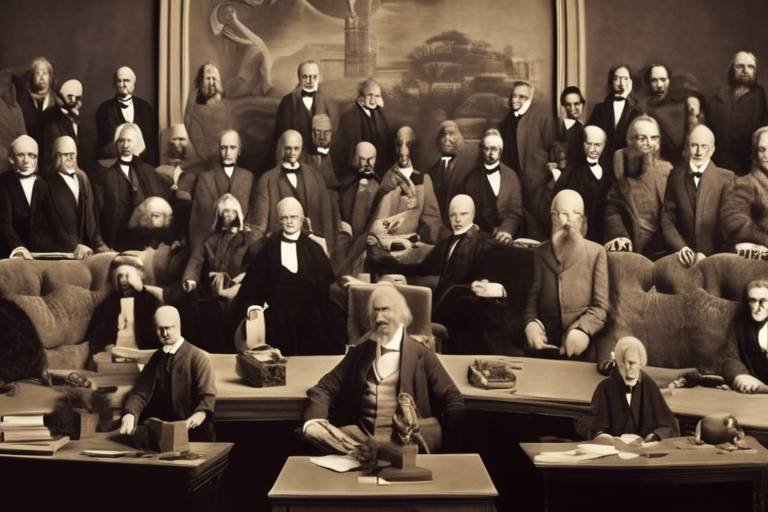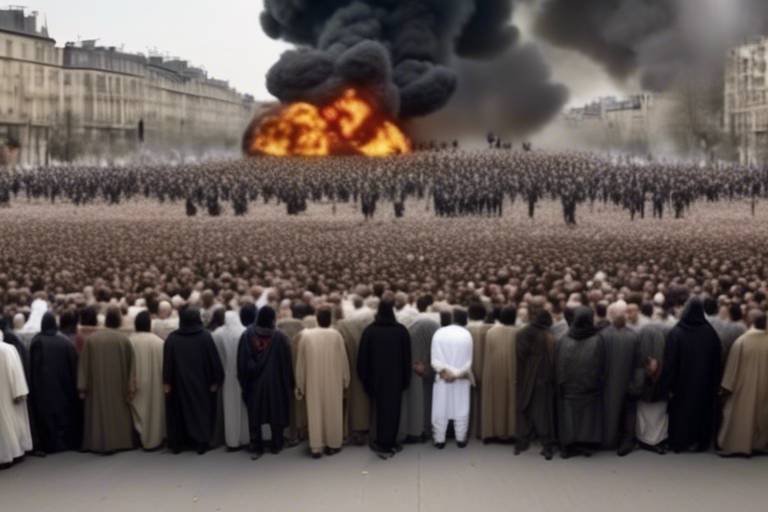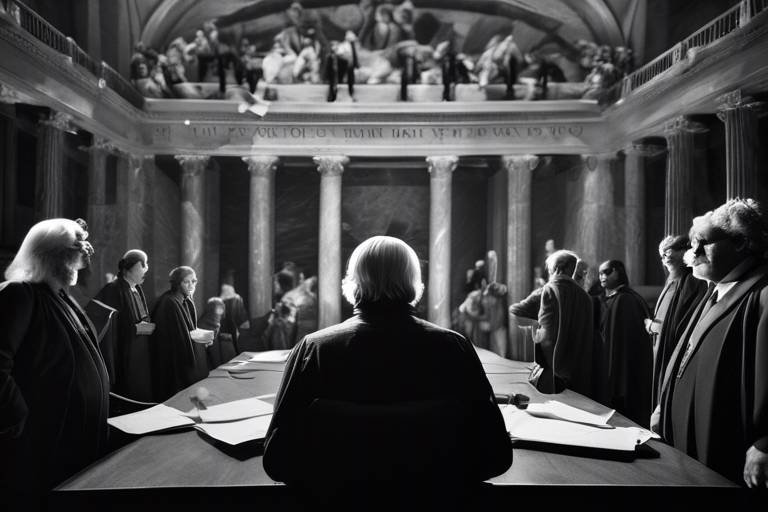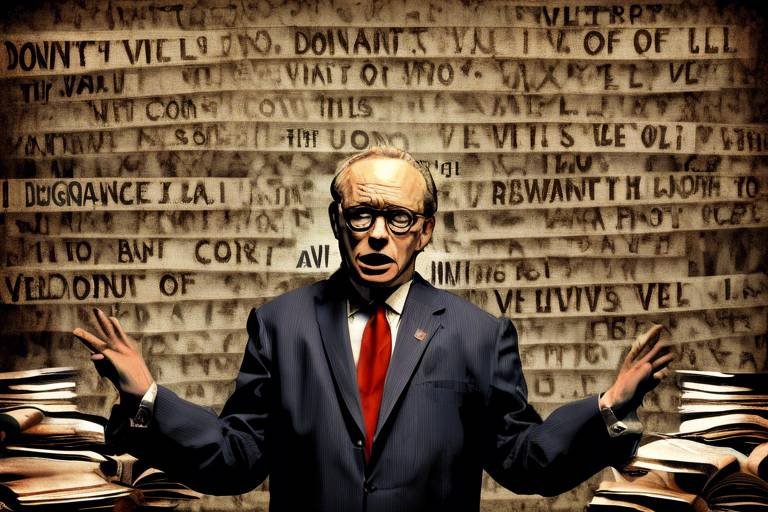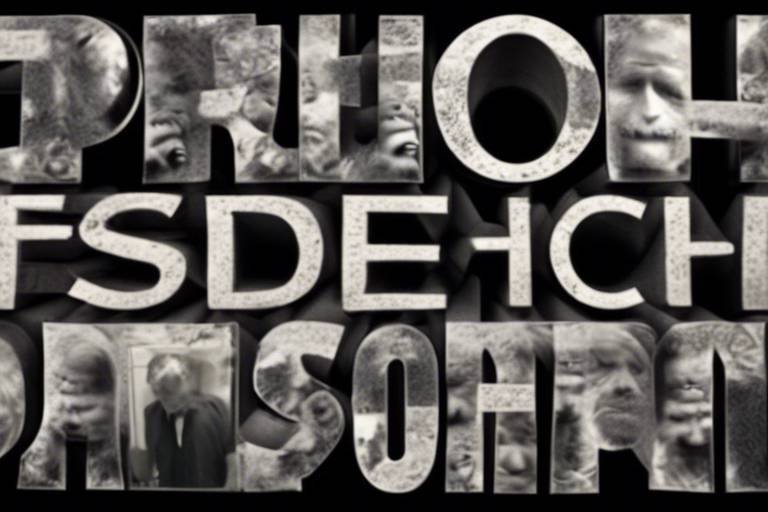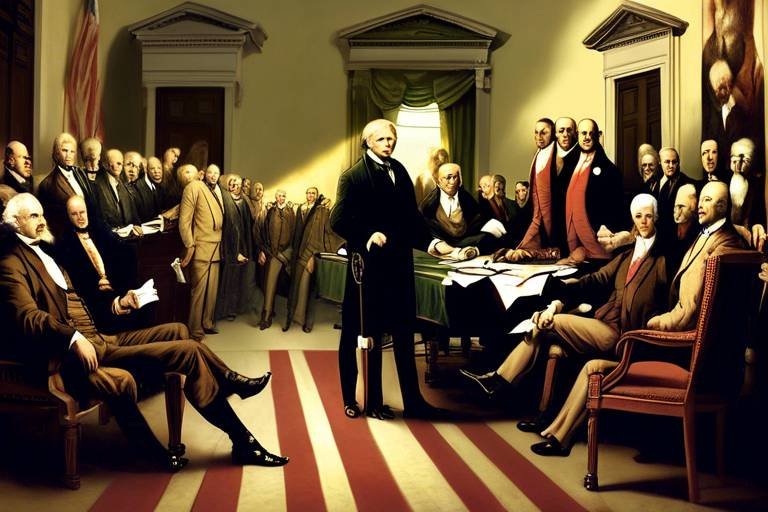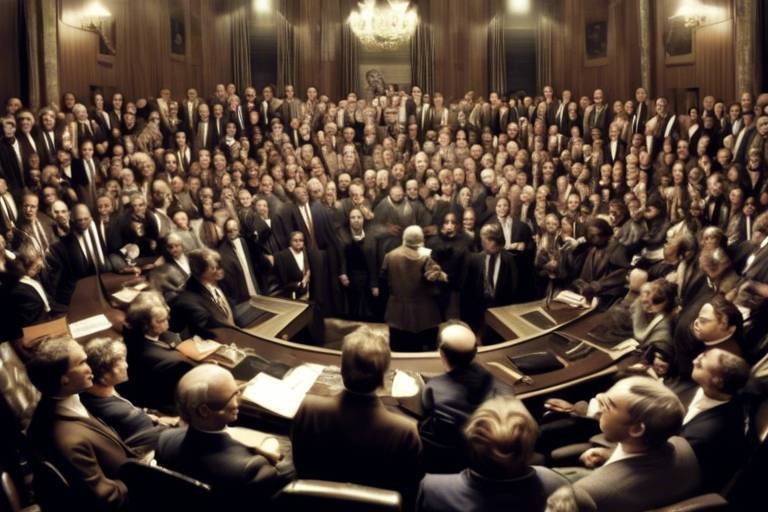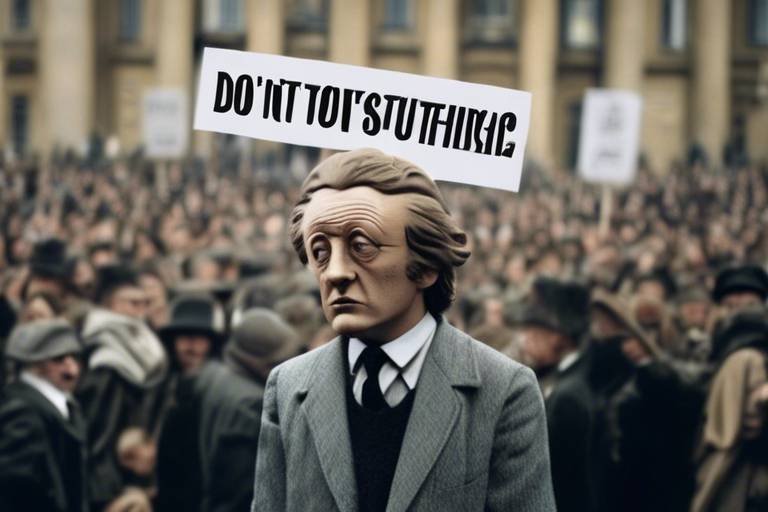How Philosophers View Power and Authority
Power and authority are two concepts that have been dissected and debated by philosophers throughout history. They are not just abstract ideas; they are the very fabric of our social interactions, governance, and personal autonomy. When we think about power, we often envision a figure at the top of a hierarchy, wielding control and influence over others. But what does this really mean? How do different thinkers interpret the dynamics of power? This article aims to explore the diverse perspectives of philosophers on power and authority, unraveling the complexities of these concepts and their implications in both historical and modern contexts.
To understand how power has been conceptualized over time, we must first look at the ancient philosophers who laid the groundwork for political thought. Thinkers like Plato and Aristotle offered foundational ideas that continue to resonate today. Plato, through his work "The Republic," proposed the idea of philosopher-kings, suggesting that the most knowledgeable individuals should govern society. He believed that true authority comes from wisdom and the pursuit of the greater good, rather than mere force or coercion. On the other hand, Aristotle took a more empirical approach, analyzing various forms of governance and advocating for a mixed government that balances the interests of different social classes.
Fast forward to modern times, and we find ourselves amidst a plethora of theories that address authority and its justification. One of the most influential frameworks is the social contract theory, which posits that authority is derived from an implicit agreement among individuals to form a society. This theory has been explored by philosophers such as Hobbes, Locke, and Rousseau, each offering unique insights into the nature of governance and individual rights.
At the heart of social contract theory is the idea that individuals consent to surrender some of their freedoms in exchange for protection and order. Hobbes, for instance, argued that in a state of nature, life would be "solitary, poor, nasty, brutish, and short." To escape this chaos, individuals must submit to an absolute authority that can maintain peace. In stark contrast, Locke believed in a more limited government, where authority is contingent upon the consent of the governed and the protection of individual rights. He famously stated that the purpose of government is to secure life, liberty, and property. Meanwhile, Rousseau emphasized the importance of collective will, arguing that true freedom is found in participating in the democratic process.
Hobbes' perspective on absolute authority raises important questions about the balance between security and freedom. He believed that a strong, centralized power was essential to prevent societal collapse. But what happens when that authority becomes tyrannical? This dilemma remains relevant today as we navigate the complexities of governance and the potential for abuse of power.
Locke's philosophy offers a refreshing counterpoint to Hobbes. By advocating for a government that is limited by law and accountable to the people, he champions the idea that authority should protect individual freedoms rather than infringe upon them. This notion has significantly influenced modern democratic principles, emphasizing the importance of consent and representation in governance.
As we delve deeper into the legitimacy of power, we encounter philosophical debates that question whether authority is justified or merely coercive. The criteria for legitimate authority can vary widely, but central to this discussion is the idea that power must be exercised in a way that respects the rights and dignity of individuals. Philosophers argue that legitimacy is not just about the source of power but also about how it is wielded and the outcomes it produces.
Power does not exist in a vacuum; it operates within the intricate web of social structures. Various philosophers have explored how power dynamics influence relationships, institutions, and societal norms. For instance, Michel Foucault challenged traditional views of power by suggesting that it is not merely concentrated in the hands of a few but is dispersed throughout society. His ideas prompt us to consider how power shapes knowledge and social practices, often in subtle and pervasive ways.
Foucault's analysis of power relations encourages us to reflect on the everyday manifestations of authority. He argued that power is everywhere and that it operates through discourse, institutions, and social norms. This perspective invites us to examine not just who holds power but how it is exercised and internalized in our lives.
Another critical aspect of power dynamics is the intersection of gender and authority. Feminist philosophy critiques traditional power structures, highlighting how gender influences authority and societal expectations. By examining the ways in which power is gendered, we gain insight into the broader implications of authority and how it shapes our experiences in society.
- What is the difference between power and authority? Power refers to the ability to influence or control others, while authority is the recognized right to exercise that power.
- How do social contract theories differ? Different philosophers have varying views on the nature of the social contract, with Hobbes advocating for absolute authority and Locke promoting limited government.
- What role does legitimacy play in authority? Legitimacy is crucial for authority to be accepted; it must be justified and aligned with the rights and values of the governed.

Historical Perspectives on Power
Power has been a central theme in philosophical discourse for centuries, with ancient thinkers like Plato and Aristotle laying the groundwork for our understanding of authority. These philosophers viewed power not just as a means of control, but as a fundamental aspect of human society that shapes governance and individual autonomy. Plato, in his work "The Republic," envisioned a society governed by philosopher-kings, suggesting that true power should come from wisdom and knowledge rather than mere force. He argued that those who understand the forms of justice and goodness are best suited to rule, as they can create a harmonious society.
On the other hand, Aristotle took a more pragmatic approach. He categorized different forms of government—monarchy, aristocracy, and polity—highlighting the importance of the middle class in maintaining stability. Aristotle believed that power should be distributed among the citizens, as this would lead to a more balanced and just society. His ideas on the "golden mean" advocate for moderation in governance, suggesting that too much power concentrated in the hands of a few can lead to tyranny.
These foundational ideas set the stage for later political thought and the evolution of authority in governance. The contrast between Plato's idealism and Aristotle's realism illustrates the ongoing tension between different views of power. While Plato's vision is aspirational, aiming for a society led by the wisest, Aristotle's approach recognizes the complexities of human nature and the necessity of practical governance.
As we move through history, the Renaissance and Enlightenment periods brought about significant changes in how power was perceived. Thinkers like Niccolò Machiavelli shifted the focus to the pragmatic exercise of power, arguing that the ends often justify the means. His work, "The Prince," is a stark departure from the idealism of earlier philosophers, emphasizing the importance of political realism. Machiavelli's ideas challenge us to consider the moral implications of power and authority, raising questions about the ethical responsibilities of leaders.
In summary, the historical perspectives on power reveal a rich tapestry of thought that has evolved over time. From Plato's philosophical ideals to Aristotle's practical governance and Machiavelli's political realism, these perspectives continue to influence our understanding of authority today. As we explore modern theories of authority, it becomes essential to reflect on these historical foundations and their implications for contemporary society.
- What is the significance of Plato's philosopher-kings?
Plato's philosopher-kings represent the idea that those who possess wisdom and knowledge are best suited to govern, ensuring a just and harmonious society.
- How did Aristotle's views differ from Plato's?
Aristotle emphasized practical governance and the importance of distributing power among citizens, contrasting with Plato's idealistic approach of rule by the wise.
- What role did Machiavelli play in the evolution of power dynamics?
Machiavelli introduced the concept of political realism, suggesting that leaders may need to use unethical means to achieve their goals, which sparked debates on the morality of power.

Modern Theories of Authority
In today's world, the concept of authority is not just a relic of the past; it is a dynamic and evolving idea that shapes our societies. Modern theories of authority delve deep into the justifications and moral grounds that underpin the power structures we see around us. These theories challenge us to think critically about who holds power, how they obtain it, and what responsibilities come with that power. At the heart of these discussions is the social contract theory, which has been pivotal in understanding the relationship between the individual and the state. This theory suggests that individuals consent, either explicitly or implicitly, to surrender some of their freedoms in exchange for the protection of their remaining rights. But what does this really mean for our day-to-day lives?
To unravel these complexities, we can look at the works of several key philosophers who have significantly contributed to modern theories of authority. Each of these thinkers presents a unique perspective that helps illuminate the multifaceted nature of authority in contemporary society. For instance, the social contract theorists—Hobbes, Locke, and Rousseau—offer contrasting views on the role of government and the rights of individuals. Their ideas serve as a foundation for understanding how authority is justified in modern governance.
The social contract theory posits that individuals come together to form a society based on mutual agreement. This theory has been a cornerstone of political philosophy, framing the way we understand governance and authority. Hobbes, Locke, and Rousseau each had distinct interpretations of this contract, which we will explore further. Their discussions revolve around fundamental questions: What rights do individuals retain? What powers do they grant to the government? And most importantly, under what circumstances can they reclaim those rights?
Thomas Hobbes, in his seminal work "Leviathan," argued for the necessity of an absolute authority to prevent chaos and disorder. He believed that in the absence of a strong central authority, human beings would revert to a state of nature characterized by violence and insecurity. Hobbes' view suggests that individuals must relinquish certain freedoms to a sovereign power that can maintain peace and security. This perspective raises critical implications for contemporary governance structures: Are we, as a society, willing to accept a concentration of power in exchange for stability? How do we balance security with the preservation of individual rights?
In stark contrast, John Locke championed the idea of a limited government that exists primarily to protect individual rights. Locke argued that authority is legitimate only when it derives from the consent of the governed. This notion places a significant emphasis on personal freedoms, asserting that individuals should retain the right to challenge authority if it fails to protect their interests. Locke's philosophy is especially relevant in modern democratic societies, where the principles of consent and accountability are foundational. His ideas prompt us to consider: How much power should governments wield, and what mechanisms should be in place to ensure they remain accountable to the people?
Another critical aspect of modern theories of authority is the legitimacy of power. Philosophers continue to debate what criteria determine whether authority is justified or coercive. The legitimacy of power often hinges on its source—whether it is derived from democratic processes, tradition, or even force. This raises essential questions about the nature of authority in our lives. Is authority inherently just, or does it require constant scrutiny and challenge? The answers to these questions are vital in shaping our understanding of governance and the rights of individuals within society.
- What is the social contract theory? The social contract theory is a philosophical concept that suggests individuals consent to form a society and accept certain limitations on their freedoms in exchange for protection of their remaining rights.
- How do Hobbes and Locke differ in their views on authority? Hobbes advocates for an absolute authority to maintain order, while Locke promotes a limited government that protects individual rights and operates with the consent of the governed.
- What determines the legitimacy of power? The legitimacy of power is often assessed based on its source, whether it is derived from democratic processes, tradition, or coercion, and whether it serves the interests of the governed.

Social Contract Theory
The concept of has played a pivotal role in shaping our understanding of political authority and individual rights. At its core, this theory suggests that individuals consent, either explicitly or implicitly, to surrender some of their freedoms to a governing body in exchange for protection and the maintenance of social order. This idea was championed by several influential philosophers, including Thomas Hobbes, John Locke, and Jean-Jacques Rousseau, each offering unique perspectives that continue to resonate in contemporary discourse.
Hobbes, in his seminal work Leviathan, argued that in a state of nature, life would be "solitary, poor, nasty, brutish, and short." To escape this chaos, individuals would agree to form a social contract, granting absolute authority to a sovereign power. This surrender of rights was seen as necessary to ensure peace and security, even if it meant relinquishing personal freedoms. Hobbes believed that without such authority, society would descend into anarchy, illustrating the importance of a strong central power in maintaining order.
In stark contrast, John Locke presented a more optimistic view of human nature and the social contract. Locke argued for a government that is limited in its powers and accountable to the people. He emphasized the protection of individual rights, particularly life, liberty, and property. According to Locke, the social contract is an agreement to form a government that exists to serve the people, and if it fails to do so, citizens retain the right to revolt. This idea laid the groundwork for modern democratic principles and the notion of government by consent.
Rousseau, meanwhile, introduced the idea of the "general will," suggesting that true authority comes from the collective will of the people rather than from a sovereign. He believed that in a just society, individuals should participate directly in the formation of laws, thus aligning personal interests with the common good. Rousseau's vision highlights the importance of civic engagement and the relationship between individual autonomy and collective governance.
The implications of social contract theory extend beyond the realm of political philosophy into the practicalities of governance. It raises essential questions about the nature of authority and the responsibilities of both the rulers and the ruled. For example, what happens when a government exceeds its mandate? How do citizens reclaim their rights? These questions are central to ongoing debates about power dynamics and the legitimacy of authority in contemporary society.
In summary, social contract theory serves as a foundational framework for understanding the relationships between individuals and the state. The contrasting views of Hobbes, Locke, and Rousseau illustrate the diverse interpretations of how authority should be structured and justified. As we navigate the complexities of modern governance, these philosophical insights remain crucial for evaluating the legitimacy of power and the rights of individuals within society.
- What is social contract theory? Social contract theory is a political philosophy that explores the legitimacy of authority in society, suggesting that individuals consent to surrender some freedoms in exchange for protection and order.
- Who are the key philosophers associated with social contract theory? The key philosophers include Thomas Hobbes, John Locke, and Jean-Jacques Rousseau, each offering distinct perspectives on the nature of authority and individual rights.
- How does Hobbes view authority? Hobbes believes in the necessity of absolute authority to prevent chaos and maintain order, arguing that individuals must surrender their rights to a sovereign power.
- What is Locke's perspective on government? Locke advocates for a limited government that protects individual rights and is accountable to the people, emphasizing the importance of consent.
- What does Rousseau mean by the "general will"? Rousseau's concept of the "general will" suggests that true authority arises from the collective will of the people, emphasizing direct participation in governance.

Hobbes and Absolute Authority
When we dive into the world of Thomas Hobbes, we encounter a thinker who boldly asserted that in order to maintain order and prevent chaos, society requires a central, absolute authority. Imagine a world without rules—anarchy reigns, and life becomes a constant struggle for survival. Hobbes, in his seminal work Leviathan, paints a stark picture of human nature, suggesting that individuals are driven by self-interest and that without a powerful sovereign to impose order, society would devolve into a "war of all against all."
Hobbes believed that individuals, in their quest for self-preservation, would willingly surrender certain freedoms to a sovereign authority in exchange for security and stability. This agreement forms the basis of his social contract theory, where the legitimacy of power is derived from the consent of the governed. However, this consent is not without its caveats; Hobbes argued that once the social contract is established, the authority of the sovereign must remain absolute to effectively maintain peace and prevent the return to chaos.
Consider this analogy: think of a ship navigating through a stormy sea. The captain (the sovereign) must make swift, sometimes harsh decisions to ensure the safety of the crew (the citizens). If the crew were to challenge the captain's authority at every turn, the ship would likely capsize, leading to disaster. In Hobbes' view, the absolute authority of the sovereign is akin to that captain's control—necessary for the survival of the ship and its crew.
However, Hobbes' perspective raises significant questions about the nature of authority and individual freedom. Can absolute authority ever be justified, or does it inevitably lead to tyranny? Critics argue that while Hobbes' ideas may provide a framework for understanding the necessity of governance, they also risk legitimizing oppressive regimes. The challenge lies in balancing the need for order with the preservation of individual liberties.
To further illustrate Hobbes' views on absolute authority, we can summarize his key principles in the following table:
| Key Principle | Description |
|---|---|
| Human Nature | Humans are inherently self-interested and competitive. |
| State of Nature | Without authority, life is "solitary, poor, nasty, brutish, and short." |
| Social Contract | Individuals consent to surrender freedoms for security. |
| Absolute Authority | To maintain order, the sovereign must have ultimate power. |
In conclusion, Hobbes' advocacy for absolute authority has sparked ongoing debates about the nature of power and governance. While his ideas serve as a foundation for understanding the necessity of a strong central authority, they also compel us to reflect on the implications of such power on individual rights and freedoms. As we navigate the complexities of modern governance, Hobbes' insights remain relevant, prompting us to consider the delicate balance between authority and autonomy.
- What is Hobbes' view on human nature?
Hobbes believed that humans are inherently self-interested and competitive, which necessitates a strong authority to maintain order. - Why does Hobbes advocate for absolute authority?
He argues that only an absolute authority can prevent chaos and ensure the safety and security of society. - How does Hobbes' social contract theory work?
According to Hobbes, individuals consent to give up certain freedoms in exchange for protection and stability provided by a sovereign.

Locke's Limited Government
John Locke, a towering figure in the realm of political philosophy, presented a vision of government that stands in stark contrast to the absolute authority championed by Thomas Hobbes. Locke's philosophy revolves around the concept of a limited government, which is fundamentally designed to protect the natural rights of individuals—namely, life, liberty, and property. Unlike Hobbes, who proposed that individuals surrender all their rights to a sovereign in exchange for security, Locke argued that the government derives its authority from the consent of the governed. This pivotal idea not only reshaped political thought in the 17th century but also laid the groundwork for modern democratic principles.
Locke believed that individuals enter into a social contract, but this contract is not a surrender of their rights; rather, it is a mutual agreement to form a government that exists to serve the people. The primary role of this government is to ensure the protection of individual rights and to provide a framework for resolving disputes. If the government fails in its duties or oversteps its boundaries—essentially violating the trust placed in it by the citizens—Locke maintained that the people have the right to rebel and establish a new government. This revolutionary idea was radical for its time and has resonated through the ages, influencing countless democratic movements around the world.
In Locke's view, the legitimacy of authority is contingent upon its ability to uphold the rights of individuals. This creates a system where power is not absolute but is instead constrained by the rule of law. The government must operate transparently and be held accountable to the populace. Locke's insistence on the importance of consent and the protection of personal freedoms means that authority is not something to be feared but rather a necessary structure that facilitates a harmonious society. His thoughts on governance can be summarized in the following key principles:
- Consent of the Governed: Authority must be derived from the explicit agreement of the people.
- Protection of Rights: The primary function of government is to safeguard individual rights.
- Right to Revolt: Citizens have the right to overthrow a government that fails to protect their rights.
- Rule of Law: Laws should govern society, not arbitrary decisions by rulers.
Locke's ideas about limited government have profound implications for contemporary political systems. They advocate for a structure where authority is balanced with individual freedoms, ensuring that power does not become a tool of oppression. By promoting a government that is accountable and responsive to its citizens, Locke's philosophy encourages active participation in governance, highlighting the importance of civic engagement in democratic societies.
In conclusion, Locke's vision of a limited government is not just a historical concept; it is a living philosophy that continues to inspire discussions about governance, authority, and individual rights. His work invites us to reflect on the balance between power and liberty, urging us to consider how best to structure our societies to promote justice and freedom for all.
- What is the main idea of Locke's limited government? Locke's limited government emphasizes the protection of individual rights and the necessity of government deriving its authority from the consent of the governed.
- How does Locke's view differ from Hobbes? While Hobbes advocates for absolute authority to maintain order, Locke believes in a government limited by the rights of individuals and accountable to the people.
- What happens if a government fails to protect individual rights according to Locke? Locke argues that citizens have the right to revolt and establish a new government if their rights are not protected.

Legitimacy of Power
When we dive into the concept of legitimacy in power, we’re essentially asking, “What makes a ruler, a government, or any authority figure justifiable in their actions?” This question is not just philosophical musing; it’s a critical inquiry that impacts our daily lives and the structures we live within. Philosophers have long debated the criteria that establish whether power is exercised legitimately or whether it becomes an oppressive force. The distinction between these two states can often be the thin line between a well-functioning society and one teetering on the edge of tyranny.
One of the foundational ideas regarding the legitimacy of power comes from the notion of consent. In democratic societies, authority is often viewed as legitimate when it derives from the consent of the governed. This means that individuals have a say in who holds power and how that power is exercised. But what happens when consent is manufactured or coerced? Herein lies a critical dilemma: if a government uses manipulation to gain consent, can it still claim legitimacy? This question echoes throughout history, especially in discussions about totalitarian regimes and their justification for rule.
Furthermore, legitimacy can also be tied to moral grounds. Philosophers like John Locke argued that authority should be rooted in the protection of natural rights—life, liberty, and property. If a government fails to uphold these rights, Locke would contend that its authority is fundamentally undermined. This perspective leads to the idea that citizens have not only the right but the duty to resist or even overthrow a government that acts against their interests. This notion is not merely theoretical; it has been the rallying cry for revolutions throughout history.
To understand legitimacy better, let's explore some key criteria that philosophers often discuss:
- Consent of the Governed: The idea that power should come from the agreement of those being governed.
- Protection of Rights: Authority must safeguard individual rights and freedoms to be considered legitimate.
- Accountability: Leaders must be accountable to the people, ensuring transparency in governance.
- Rule of Law: Laws must apply equally to all, including those in power, to maintain legitimacy.
In contemporary discussions, legitimacy is further complicated by issues of representation. Are all voices heard in the political process? Are marginalized groups included in the decision-making? The legitimacy of power is often called into question when segments of the population feel disenfranchised or ignored. This is where the philosophical debate intersects with social movements, as advocates for justice and equality strive to ensure that authority is not just an abstract concept but a lived reality for all.
Ultimately, the legitimacy of power is not a static concept but a dynamic interplay between authority, consent, and the moral obligations of those who wield power. As society evolves, so too will our understanding of what makes authority justifiable. The ongoing dialogue among philosophers, politicians, and citizens is crucial in shaping a future where power is not just held, but is rightfully exercised for the common good.
- What is the difference between power and authority? Power refers to the ability to influence or control others, while authority is the recognized right to exercise that power.
- How do philosophers define legitimacy? Legitimacy is defined as the justification for power and authority, often rooted in consent, moral grounds, and accountability.
- Can a government lose its legitimacy? Yes, a government can lose its legitimacy if it fails to protect the rights of its citizens or if it governs without their consent.

Power Dynamics in Society
Understanding power dynamics in society is akin to peeling an onion; each layer reveals deeper complexities and nuances that influence our daily lives. Power is not merely about authority or control; it is a web of relationships that shapes interactions between individuals, institutions, and communities. Philosophers have long debated how power manifests in social structures, often highlighting its pervasive nature and the subtle ways it operates. For instance, the way power is distributed impacts not only governance but also personal relationships and societal norms. In this intricate dance, we find that power can be both a tool for oppression and a means of liberation, depending on who wields it and how it is exercised.
To illustrate this, let’s consider the views of various philosophers who have examined the fabric of power in society. Michel Foucault, a prominent figure in contemporary philosophy, argued that power is not just something that is held by a select few; instead, it is dispersed throughout society. He famously stated that "power is everywhere," suggesting that it operates through social norms, institutions, and even knowledge itself. This leads us to a critical understanding: power is not merely top-down; it flows in multiple directions and can be challenged from various angles.
Furthermore, Foucault’s analysis of power relations emphasizes how knowledge and power are intertwined. He posited that what we consider "truth" is often shaped by the power structures in place. For example, the medical field has historically wielded power over individuals by defining what is considered healthy or unhealthy, thereby influencing societal perceptions and behaviors. This interplay between knowledge and power raises important questions about who gets to define norms and values in society, and what happens to those who dissent.
Moreover, the dynamics of power are not only influenced by philosophical theories but are also shaped by social constructs such as gender, race, and class. Feminist philosophers, for instance, critique traditional power structures that have marginalized women's voices and experiences. They argue that gender dynamics play a crucial role in shaping authority and societal expectations. In many cultures, power has historically been associated with masculinity, leading to systemic inequalities that persist today. This critique urges us to reconsider how power is distributed and who benefits from existing structures.
To further explore these themes, let’s look at a table that summarizes the perspectives of key philosophers on power dynamics:
| Philosopher | Key Ideas on Power |
|---|---|
| Michel Foucault | Power is dispersed throughout society; knowledge shapes power dynamics. |
| Feminist Philosophers | Critique of traditional power structures; emphasis on gender dynamics in authority. |
| Max Weber | Authority is categorized into three types: traditional, charismatic, and legal-rational. |
As we navigate through these philosophical insights, it becomes evident that power dynamics are not static; they evolve with societal changes and cultural shifts. Understanding these dynamics allows us to question the status quo and advocate for more equitable power distributions. Are we, as individuals, aware of the power we hold in our relationships and communities? Can we challenge the existing norms that perpetuate inequality? These questions are vital as we strive for a society where power is not a privilege of the few but a shared responsibility among all.
- What is power dynamics? Power dynamics refer to the ways in which power is distributed and exercised within social structures, affecting relationships and institutions.
- How does Foucault view power? Foucault sees power as dispersed throughout society, operating through various institutions and relationships rather than being concentrated in a single authority.
- Why is understanding power dynamics important? Understanding power dynamics helps individuals recognize their roles within society and advocate for more equitable systems and relationships.

Foucault and Power Relations
When we think about power, we often picture it as something held by a select few—like a king on a throne or a CEO in a skyscraper office. However, Michel Foucault, a groundbreaking philosopher of the 20th century, flipped this notion on its head. He argued that power is not just concentrated in the hands of the elite; instead, it is dispersed throughout society, operating in various forms and influencing our daily lives in ways we might not even realize.
Foucault's perspective on power is best understood through his concept of power relations. He posited that power is everywhere and is exercised through relationships rather than being a static entity. This means that power is not something one possesses; rather, it is a dynamic force that flows through interactions among individuals and institutions. For instance, consider how a teacher exerts power over students, not just through authority but also through knowledge and social norms. This kind of power is subtle yet pervasive, shaping behaviors and expectations.
In Foucault's view, power is closely tied to knowledge. He famously stated that "knowledge is power," suggesting that those who control knowledge also control power dynamics within society. This leads to a fascinating implication: the more knowledge one has, the more power one can wield. This interplay between knowledge and power can be seen in various contexts, from the medical field to education, where the definition of what is considered "normal" or "healthy" often reflects the interests of those in power.
Moreover, Foucault introduced the idea of disciplinary power, which refers to the ways in which institutions (like schools, prisons, and hospitals) regulate behavior and enforce norms. This is not merely about punishment; it’s about shaping individuals to conform to societal expectations. For example, the way schools discipline students through grades and behavioral standards encourages conformity and compliance, effectively molding them into productive members of society. This form of power is insidious, operating through subtle mechanisms rather than overt force.
Foucault also emphasized that power is not inherently negative. It can produce positive outcomes, such as social change and the empowerment of marginalized groups. By recognizing how power operates, individuals can challenge oppressive systems and advocate for their rights. This perspective invites us to reflect on our own roles within power structures and encourages us to engage critically with the world around us.
To illustrate Foucault's ideas further, consider the following table that summarizes key aspects of his theory on power relations:
| Aspect | Description |
|---|---|
| Power is relational | Power exists in relationships and is exercised through interactions. |
| Knowledge and power | Those who control knowledge influence societal norms and expectations. |
| Disciplinary power | Institutions regulate behavior and enforce norms through subtle mechanisms. |
| Positive outcomes | Power can lead to social change and empowerment for marginalized groups. |
In conclusion, Foucault's examination of power relations provides a profound understanding of how power operates in everyday life. By recognizing that power is not just a top-down force but a complex web of interactions, we can better navigate our social environments and challenge the status quo. Are we merely subjects of power, or can we also be its agents? This question invites us to reflect on our own positions and responsibilities in the ongoing dance of power within our societies.
- What is Foucault's main argument about power?
Foucault argues that power is dispersed throughout society and is exercised through relationships rather than being concentrated in the hands of a few. - How does knowledge relate to power according to Foucault?
Foucault posits that knowledge is a form of power; those who control knowledge can influence societal norms and expectations. - What is disciplinary power?
Disciplinary power refers to the ways institutions regulate behavior and enforce norms through subtle mechanisms rather than overt force. - Can power have positive outcomes?
Yes, Foucault suggests that power can lead to social change and the empowerment of marginalized groups.

Gender and Power
The relationship between gender and power is a complex tapestry woven from historical, social, and cultural threads. Feminist philosophers have long critiqued traditional power structures, arguing that they are often dominated by patriarchal norms that marginalize women's voices and experiences. This critique is not just an academic exercise; it has profound implications for how authority is perceived and exercised in society. Imagine walking into a room where the decisions are made by a select few, and those few are predominantly men. This scenario is not just a metaphor; it's a reality in many sectors, from politics to business, where gender dynamics shape authority and influence societal norms.
One of the key arguments presented by feminist theorists is that power is not merely a top-down structure but rather a complex web of relationships that can be influenced by gender. Power dynamics are often invisible, yet they dictate how individuals interact, how policies are shaped, and how societal expectations are formed. For instance, consider the workplace: women may find themselves in positions of authority, but often they must navigate a labyrinth of biases and stereotypes that question their competence. This phenomenon can lead to what is known as the glass ceiling, a barrier that prevents women from rising to the highest levels of leadership despite their qualifications and efforts.
Moreover, the intersectionality of gender with other identities—such as race, class, and sexuality—further complicates the landscape of power. Women of color, for example, face unique challenges that are often overlooked in mainstream feminist discourses. This intersectional approach highlights that power is not monolithic; rather, it varies dramatically based on an individual's social position. As a result, addressing gender and power requires a nuanced understanding of these intersections. Feminist philosophers argue for a more inclusive approach to authority, one that recognizes the diverse experiences of all individuals and seeks to dismantle oppressive structures.
To illustrate the impact of gender on power dynamics, let's consider a few key areas:
- Political Representation: Women remain underrepresented in political offices globally, which skews policy-making in favor of male-centric perspectives.
- Workplace Equality: Gender pay gaps persist, with women often earning less than their male counterparts for similar roles, reflecting a systemic inequality.
- Social Norms: Traditional gender roles continue to dictate expectations of behavior and authority, influencing how individuals assert power in various contexts.
Feminist philosophers advocate for a re-examination of these power structures, pushing for a paradigm shift that embraces equality and equity. By challenging the status quo, they aim to create a society where authority is not synonymous with gender but rather a reflection of individual capability and merit. This transformation is not merely aspirational; it is essential for fostering a more just and equitable world.
In conclusion, the interplay between gender and power is a critical area of philosophical inquiry that demands our attention. As we navigate the complexities of modern society, it is imperative to recognize and address the ways in which gender shapes authority and influences our collective experience. Only by doing so can we hope to achieve a more inclusive and equitable distribution of power that reflects the diverse tapestry of human experience.
- What is the glass ceiling? The glass ceiling refers to the invisible barriers that prevent women and minorities from advancing to the highest levels of leadership in their careers.
- How does intersectionality relate to gender and power? Intersectionality is the concept that different social identities, such as race, class, and gender, intersect to create unique experiences of oppression and privilege, affecting how power is distributed and experienced.
- Why is feminist philosophy important in discussions of power? Feminist philosophy provides critical insights into how traditional power structures operate and offers frameworks for understanding and dismantling inequalities based on gender.
Frequently Asked Questions
- What is the main difference between Hobbes and Locke regarding authority?
Hobbes believed in the necessity of absolute authority to maintain order, arguing that a strong central power is essential to prevent chaos. In contrast, Locke championed limited government, emphasizing individual rights and the importance of consent as the foundation of political authority.
- How does social contract theory relate to modern governance?
Social contract theory suggests that individuals consent, either explicitly or implicitly, to surrender some of their freedoms in exchange for protection and order provided by the government. This concept remains central to discussions of legitimacy and the moral grounds for authority in contemporary political systems.
- What role does power play in societal structures according to philosophers?
Philosophers argue that power operates within social structures by influencing relationships, institutions, and societal norms. This dynamic can lead to the reinforcement or challenge of existing hierarchies, shaping how individuals interact and understand authority.
- How does Foucault's view on power differ from traditional perspectives?
Michel Foucault proposed that power is not merely held by a few individuals or institutions but is dispersed throughout society. This means that power dynamics influence knowledge, social practices, and relationships in more complex ways than traditional views of power suggest.
- What is the feminist critique of traditional power structures?
Feminist philosophy critiques traditional power structures by highlighting how gender dynamics shape authority and societal norms. It argues for the need to recognize and challenge these power imbalances to promote equality and justice for all genders.

